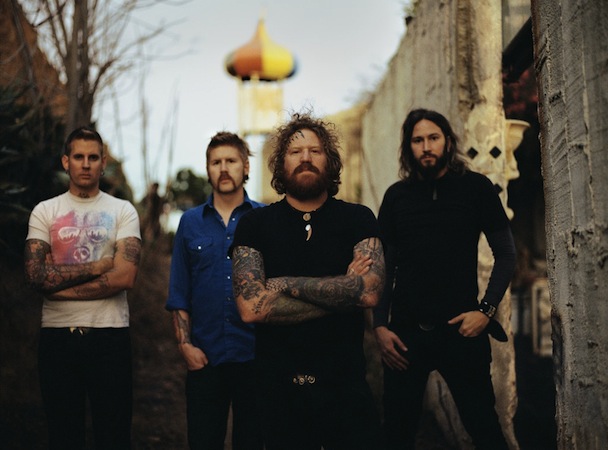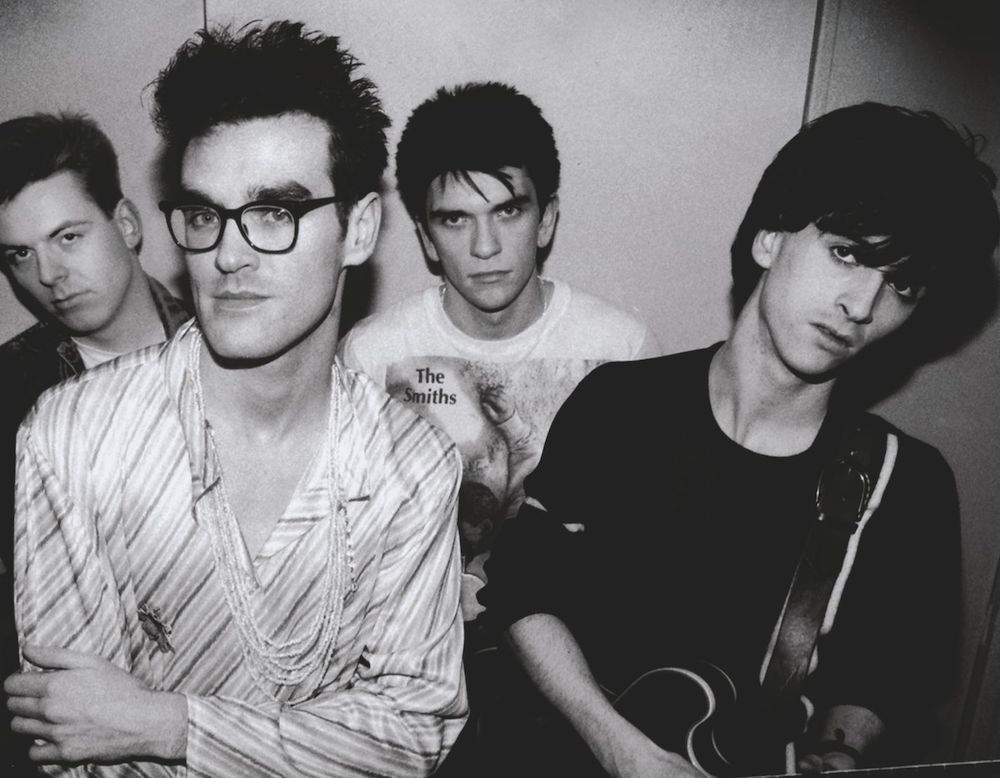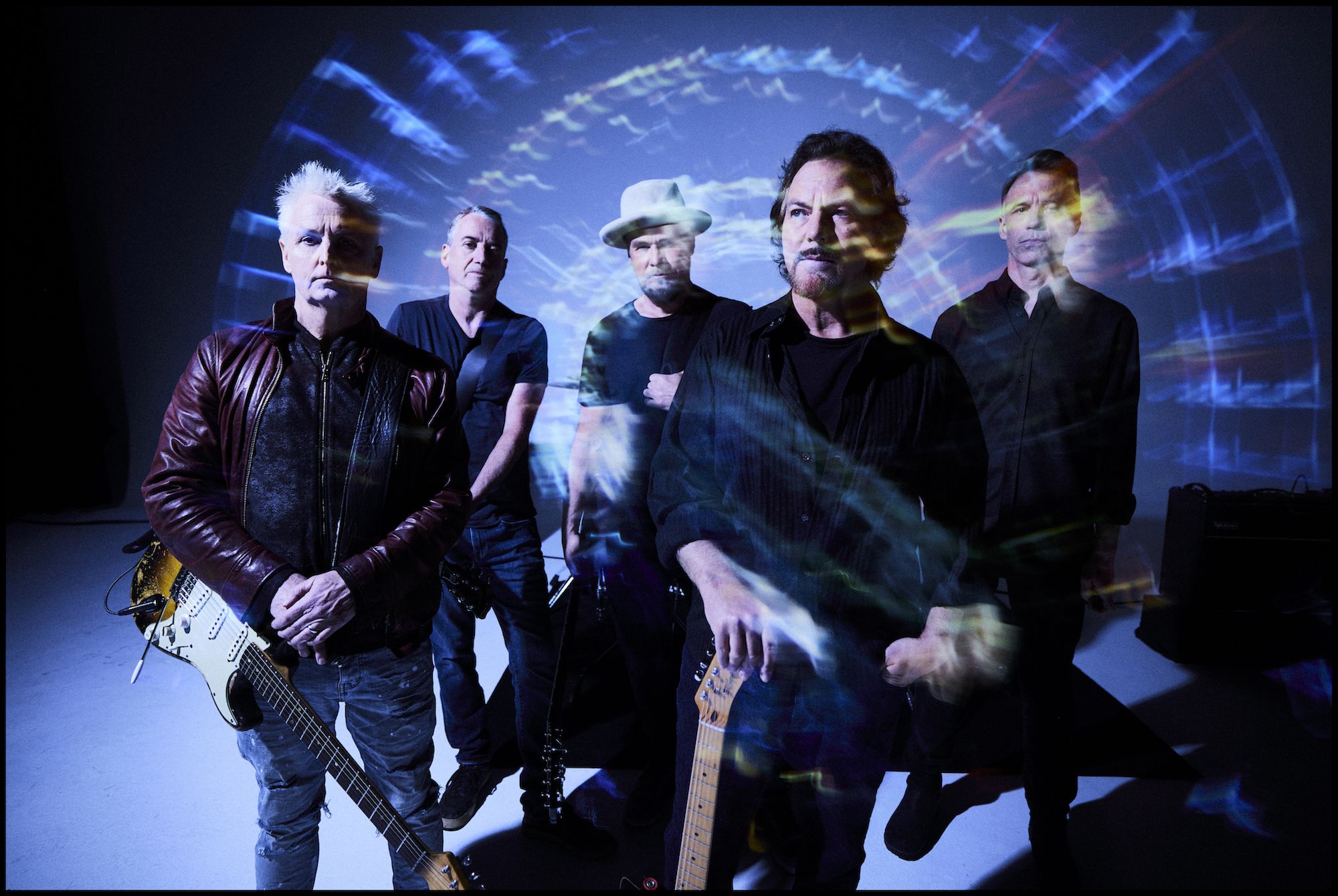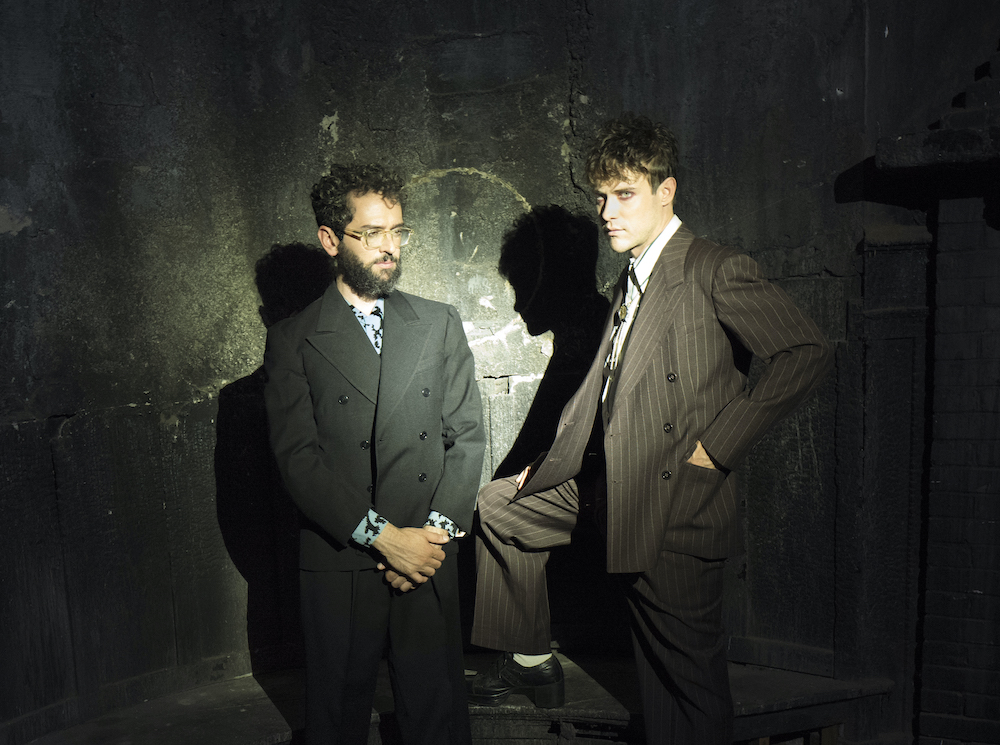OK, so music culture has become increasingly atomized. There's enough music out there, and enough services to parse it, that anyone can build a library of obscure artists that cater precisely to their incredibly abstruse micro-tastes. This means that unifying cultural-force bands have become rare unto extinction. We all know this.
This effect has proven especially strong in genres already populated by niche-obsessed nerds. Metal is an excellent case study. Even dyed-in-the-wool metal dweebs acknowledge that its subgenre stratification has gotten out of control. People consider "goregrind" and "pornogrind" different things. Mull that over for a sec.
So as you'd expect, there's no real consensus around top-flight contemporary metal bands. It's rare that a single album becomes an across-the-spectrum event in this pocket world. Occasional up-and-coming buzz bands manage the feat. (Think Deafheaven this year, or Pallbearer last year.) New releases by time-tested heroes -- Iron Maiden, Slayer, Morbid Angel, and so forth -- usually do too.
In between these two realms lie Mastodon. Having formed in 1999, they are no legacy band. By the same token, they are not neophytes. Nonetheless, each of their albums has drawn comment from all walks of metal life, and even more from outsiders, for whom Mastodon have a great deal of appeal. Even stodgy purists tramp forth for such occasions, if only to hurl insults.
Why do Mastodon draw such strong reactions from so many? It is not, ultimately, because they are so original. Which isn't to say that they're not creative. Mastodon's compositional genius lies in their ability to cleverly recombine, like collage artists. The band -- guitarists Brent Hinds and Bill Kelliher, bassist Troy Sanders, and Mitch Mitchell-inspired drummer Bränn Dailor -- coalesced after its members struck up a conversation about their mutual love for Thin Lizzy and '70s prog rock at an early High On Fire show. Which, if you think about it, sums up most of their approach. (The missing ingredient here is Neurosis; more on that later.) Theirs is a thoroughly postmodern approach to heavy metal, full of witty references to forebears and mid-stream stylistic leaps that cohere into a remarkably new-sounding whole.
But for most people, this stuff is mere trivia. The biggest reason that Mastodon has done so incredibly well for themselves is because -- just as the name suggests -- they're larger than life. Think about it: the rags-to-riches story (which has earned them many an unsubstantiated comparison to Metallica); the indifference to genre constraints; the overblown album concepts, beginning with Moby-Dick on their sophomore fucking record and getting weirder from there; the idiotic mid-career celebrity punch-ups; the obscurantist beginnings that gave way to increasingly broad appeal. These features all speak of a swaggering rock-star magnetism that is largely missing from the grim, introverted world of 21st-century metal. Most current metal bands want nothing more than to impress their immediate peers. Mastodon wanted to change the world. And judging by the oodles of Masto-clones running around today, they succeeded.
Here are the 10 Mastodon songs that I think most favorably represent the band, in order of increasing awesomeness. Like all of the 10-best lists I've done here, this one is a compromise between my personal favorite Mastodon songs and their most critically acclaimed work. It is weighted toward their first two records, which I consider their strongest. (A fact for which I will not apologize; if you're pissed, just thank your lucky stars that I didn't submit a list of the first 10 songs from Remission.) However, like all great bands, Mastodon's catalog is rich enough that virtually all preferences among their five albums and multiple EPs are justifiable. Let's hear your version in the comments.
10. "Seabeast" (from Leviathan, 2004)
Pretty much every Mastodon album offers enough showstopper moments to ensure diversity of opinion amongst the faithful. Leviathan might be the worst offender of the bunch; there's a reason it's both their critical peak and their fan favorite. But if you had to pick a riff from that album to hear on loop for the next year, you could do worse than the closing riff from "Seabeast." If all those Metallica comparisons are justified by anything in Mastodon's catalog, it's the thrashy beating that kicks off at 3:30 -- the rhythm is kind of a tongue-twister and the snare hits dodge around the downbeat half the time, but you don't really care about that nerdy crap because you're too busy pumping your fist and banging your head.
9. "Circle Of Cysquatch" (from Blood Mountain, 2006)
Blood Mountain was a pivotal album for Mastodon. It's the most daring leap forward in their catalog, and it marks the moment at which their music flipped from "sludgy metal with progressive notes" to "progressive metal with sludge notes." The transition was rough. Blood Mountain brims with lopsided compositions and painful singing, but even during this awkward adolescence, Mastodon's gifts shine through. Some folks undoubtedly prefer "Crystal Skull" or the Josh Homme vehicle "Colony Of Birchmen," but "Circle Of Cysquatch" strikes the finest balance of any Blood Mountain song. It opens with an earworm lick, the Dalek vox in the bridge work like a charm, and the closing riff is among the band's heaviest.
8. "All The Heavy Lifting" (from The Hunter, 2011)
Like most metal bands that break out of the niche-appeal ghetto, Mastodon have always possessed a clandestine pop sensibility. That sensibility has grown increasingly obvious over the course of their career; The Hunter stripped its camouflage away and plopped it at the forefront of their sound. Given the constraints of their singer-by-committee vocal setup, doing so was a risky move, and it didn't always work. That's why "All The Heavy Lifting" is such a triumph for Mastodon. Its Hinds/Sanders/Dailor harmonized chorus finally delivers the arena-ready vocal hook that the band had been building to since the mid-aughts, and it is glorious. "We didn't come this far just to turn around … Just ahead we will hear the sound/ That gives us a brand new day," goes the final verse. Here's hoping they're right.
7. "Crack The Skye" (from Crack The Skye, 2009)
In 2003, Mastodon played the Relapse Records Contamination Festival in Philly. The fest was a crazy one-off event in a dinky thousand-cap venue (the Trocadero), and it served as a baton pass for 21st-century metal. '90s favorites like Neurosis and Today Is The Day stood shoulder-to-shoulder with a host of younger bands that would go on to set the tone for the coming decade, including the Dillinger Escape Plan, High On Fire, Pig Destroyer, Dysrhythmia, and Remission-era Mastodon. Relapse released a DVD of the festival that included a few interviews with the performers; among them is a clip of Troy Sanders earnestly telling the camera that Neurosis changed his life. Neurosis vocalist/guitarist Scott Kelly has contributed a guest vocal appearance to every Mastodon album since. His spot on the title track from Crack The Skye is the best of the bunch; his massive bellowing in the verse elevates a strong track into the realms of greatness.
6. "Trainwreck" (from Remission, 2002)
Though Remission is the only Mastodon album that doesn't feature a Kelly guest vocal performance, it bears the most overt Neurosis influence of the bunch. Nowhere is that influence more obvious than on "Trainwreck." But in true Mastodon fashion, the song isn't an imitation or even a pastiche -- it just uses the handiest tool for the job. "Trainwreck" opens with a lovely Allman-esque prog jam, and while the twinkly arpeggios eventually get muscled aside by a wall of guitar beef, the tuned-to-Z riffs refrain from locking into a mesmerizing groove. Instead, they slide all over the meter, even ducking out of view on occasion to make room for surprisingly pretty harmonies. It's an emotionally devastating listen, and one of the best on the album.
5. "The Czar" (from Crack The Skye, 2009)
If "Trainwreck" is Mastodon's most direct tribute to Neurosis, "The Czar" is their clearest homage to the progressive rock that so heavily informs their later work. "The Czar" is structured as a set of loosely related suites; Bill Kelliher has remarked that each suite could work as a stand-alone track. Despite this ponderous construction, this tune is a remarkably breezy listen for its 11 minutes. The real kicker here is the Brent Hinds lead break at about the 8:20 mark: a towering, righteously messy shredfest that would make Mastodon's classic-rock ancestors proud. Hinds doesn't get talked up much as a soloist, and he deserves more credit for his efforts -- he plays with an intensity that most metal guitarists would envy, and this lead is perhaps his finest hour to date.
4. "Mother Puncher" (from Remission, 2002)
If you hadn't gathered from the rest of this list, Mastodon's career highlights often swing on individual guitar riffs. That's how it should be. Mastodon are a metal band, and metal bands live and die on the strength of their riffs. But "Mother Puncher" isn't so great because of an individual riff. It's great because of every riff. That's right, every part of this song features 10-outta-10 riffage: the blues-based opener; the nimble dance that follows; the huge, borderline death-metal slam part at 1:47; and the marching outro. Like most of Remission, it's all done with very little vocal support, it's under four minutes, and it's just as brutal as its title. "Mother Puncher" is a master class in efficient, effective heavy metal songcraft.
3. "Hearts Alive" (from Leviathan, 2004)
It was clear from the first that Mastodon had big dreams. Even early EPs like Lifesblood and Slick Leg lean toward flamboyance, and the songs that comprise Remission regularly pass the 6-minute mark. Leviathan, with its pompous literary theme, virtually shoves Mastodon's ambitions in your face. Ironically, most of Leviathan is relatively restrained, compositionally speaking; the first eight songs average out to about 3:40 apiece. And then there's "Hearts Alive." Mastodon's first gigantic prog sprawler is also their best; I can only speculate as to how many teenage Slayer fans have had their minds blown by this celebration of scope and excess. When you think about how musically conservative mainstream metal was in 2004 (the bestselling metal album that year was by friggin' Nightwish), it's a minor miracle that Mastodon broke big with an album built around this monster.
2. "Blood And Thunder" (from Leviathan, 2004)
This tune is the yin to the yang of "Hearts Alive" -- the greatest of the mercilessly efficient bangers that set up Mastodon's tech-dork wackiness. "Blood and Thunder" adheres to the most conventional pop format possible; it's an arrow-straight, verse-chorus-verse-chorus-bridge-chorus affair. Like most successful pop songs, its pieces all fall ineffably into line. There's a place for everything, and everything is in its place. It just so happens that those pieces consist of a deeply weird combination of metal subgenres, rounded out with a pile-on chorus ("White! Whale! Holy! Grail!"), and topped off with a legendary guest vocal spot from Clutch's Neil Fallon. And then there's that opening riff, which has managed to lodge itself in my brain for damn near a decade. Leviathan is an album about obsessive focus, and no song in Mastodon's directory is more obsessively focused than this.
1. "March Of The Fire Ants" (from Remission, 2002)
I started this piece off by describing Mastodon as collage artists, and I stand by that account of their music. I also don't mean said description as a criticism; musical progress happens incrementally, and any honest musician should be upfront about his influences. But once in a while, great bands transcend their roots and issue forth a piece of music that could not possibly have come from anyone else. Mastodon gave us that piece of sublime originality in the form of "March Of The Fire Ants." Though they've become bona fide rock stars and spawned countless clones over the 11 years since this song's debut, it still sounds thoroughly new and iconic; it could come out today and still turn countless heads. This song marks the first moment at which Mastodon ceased being a band with influences and became an influence to other bands. It's no wonder that it launched such a remarkably successful career.
Listen to our Spotify playlist here






